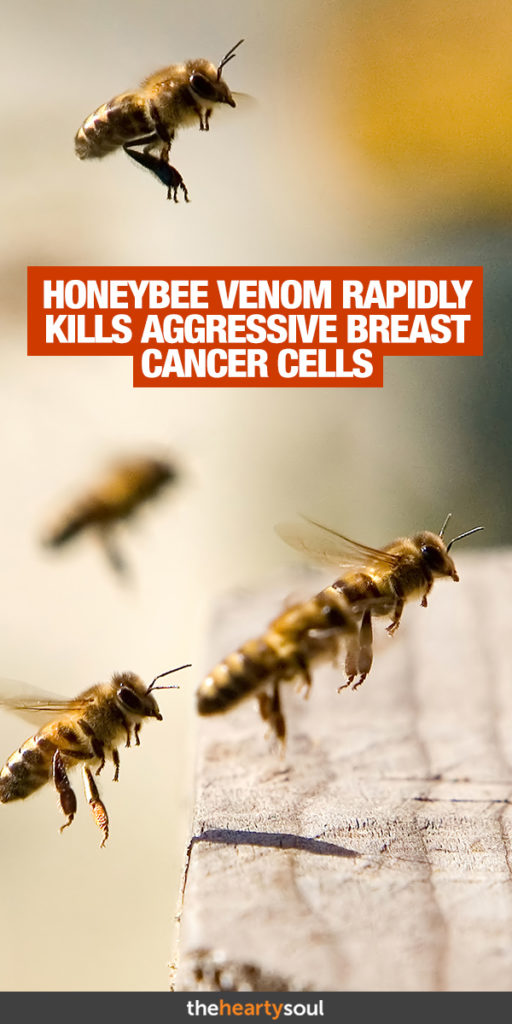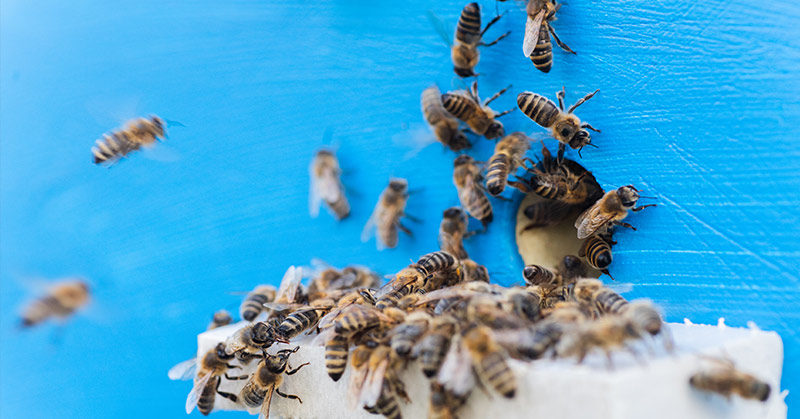A team of researchers in Australia, have potentially found an effective way to treat certain types of breast cancer: honeybee venom. While most of us associate a bee sting with pain and discomfort, it seems as though the chemicals in the insect’s venom may actually be the solution doctors have been searching for.
Breast Cancer in the U.S.
Approximately twelve percent of women in the United States will develop breast cancer in her lifetime, and an estimated 325 thousand new cases of breast cancer are expected to be diagnosed in the US by the end of the year 2020 [1].
About ten to twenty percent of all breast cancer cases are either triple-negative or HER-2 enriched, which are very aggressive, difficult to treat, and don’t respond to normal therapies the way other types of cancer do [2,3].
Read: When this mom found out her daughter bullied a kid at school with cancer, she shaved her head.
Honeybee Venom Kills Cancer
25-year-old Ph.D. researcher, Dr. Ciara Duffy, and a team of researchers at Harry Perkins Institute of Medical Research in Perth, Australia, found that the venom from honeybees has the ability to rapidly kill aggressive and hard-to-treat cancer cells [4].
In addition, the study found that when combined with traditional chemotherapy drugs, the bee venom was capable of reducing tumor growth in mice extremely efficiently. In particular, the bee venom was effective at killing triple-negative and HER-2 breast cancer cells, killing one hundred percent of those cells within sixty minutes, while having very little effect on healthy cells.
“We found that the venom from honeybees is remarkably effective in killing some of these really aggressive breast cancer cells at concentrations which aren’t as damaging to normal cells,” Dr Duffy said [4].
The study, which was published in the journal Nature Precision Oncology, used honeybees from Australia, Ireland, and England, with Dr. Duffy noting that Perth honeybees are some of the healthiest in the world [4].
The researchers tested venom from over three hundred honeybees and bumblebees, and the honeybee venom was found to be vastly more potent than that of the bumblebees [5].
Read: 8 of the Best Anti-Cancer Foods. It’s Time to Start Adding them to Your Diet
Melittin: Honeybee Venom’s Secret Weapon
Honeybee venom has been used before to treat other health issues, including eczema and melanoma, but exactly how it works against tumours at the molecular level has not previously been well-understood.
This new research has determined that much of the anti-cancer effects exerted by bee venom come from a chemical called melittin, which makes up half of their venom and is the reason why bee stings are so painful.
The bumblebee venom, which does not contain melittin but does have other potential cell-killers, had little to no effect on cancer cells, but the honeybee venom was impressively effective.
“We found that melittin can completely destroy cancer cell membranes within 60 minutes,” said Dr. Duffy [6].
In order to be sure that melittin was, in fact, responsible for the venom’s anti-cancer properties, the researchers performed some tests in which they blocked the melittin with an antibody. In these tests, the cancer cells exposed to the venom survived, proving that melittin was indeed the key component.
“This study demonstrates how melittin interferes with signalling pathways within breast cancer cells to reduce cell replication,” said Western Australia’s Chief Scientist Peter Klinken, who was not involved in this study [6].
Two other benefits to the Bee Venom Molecule
There are two other major benefits to using melittin as a treatment for cancer:
- It was found to have little impact on healthy cells
- Melittin can be produced synthetically while still producing the same effects as real honeybee venom.
Read: This one photo of lemons is helping women detect breast cancer
How does melittin actually kill cancer cells?
“What melittin does is it actually enters the surface, or the plasma membrane, and forms holes or pores and it just causes the cell to die,” Dr Duffy said [4].
Dr. Duffy and her team also found that the melittin exerted another very powerful effect: Within twenty minutes, it began interfering with the messaging or signalling pathways that are necessary for cancer cells to grow and replicate, effectively shutting down their production [4].
Finally, when used in conjunction with chemotherapy, Dr. Duffy found that the holes created by the melittin in the cancer cell membranes allowed the chemotherapy to enter the cell and work much more efficiently at reducing tumour size in mice [4].
Honeybee Venom: The Treatment of the Future?
Dr. Duffy has been very careful to avoid using the words “breakthrough” or “cure” when talking about her research, and she stressed that much more research needs to be done. Plenty of things can kill cancer in a petri dish, but don’t always work as effectively in the human body.
“Future studies to formally assess toxicities and maximum tolerated doses of these peptides will be required prior to human trials,” the team wrote in their paper [7].
Still, the research is an exciting step toward more effective cancer treatment in the future.
“I think it’s incredibly exciting that they’ve made this observation that the molecule melittin can actually affect the cancer cells, but that it can work in combination with other drugs which come from natural products as well, and in combination they’re really knocking these cancer cells on the head,” said Klinken [4].
Dr. Duffy is hopeful, but says that they have a long way to go to figure out how to best deliver it in the body and to determine the maximum tolerated doses before it could be used as a viable treatment in hospitals [4].
Keep Reading: New Breast Cancer Test Could Detect Cancer 5 Years Earlier

- https://www.breastcancer.org/symptoms/understand_bc/statistics
- https://www.breastcancer.org/symptoms/diagnosis/trip_neg
- https://www.mayoclinic.org/breast-cancer/expert-answers/faq-20058066#:~:text=HER2%2Dpositive%20breast%20cancer%20is,that%20makes%20the%20HER2%20protein.
- https://www.abc.net.au/news/2020-09-01/new-aus-research-finds-honey-bee-venom-kills-breast-cancer-cells/12618064?fbclid=IwAR2SXsDQp8A6F8N5Pg-JJIGim5wCrJcZprS2lCHTV3RkZ6bGQvNVYUFaT4o
- https://www.bbc.com/news/world-australia-53994058
- https://www.sciencealert.com/bees-formidable-weapons-could-successfully-target-aggressive-breast-cancer
- https://www.nature.com/articles/s41698-020-00129-0

